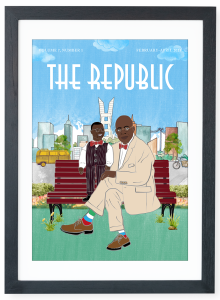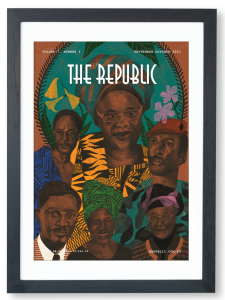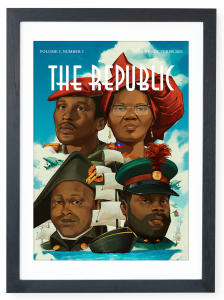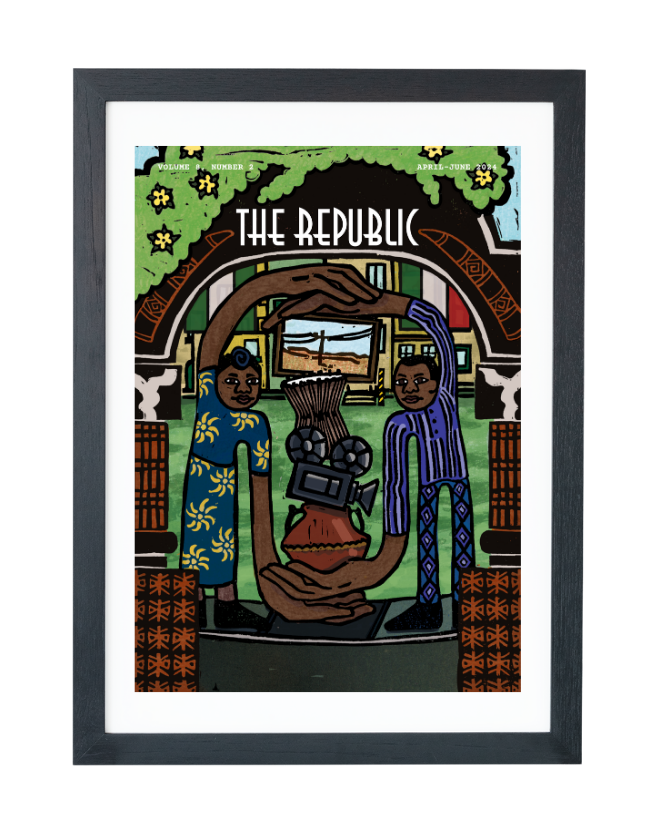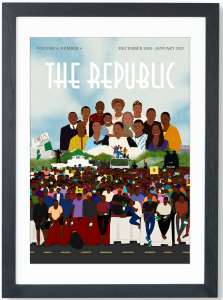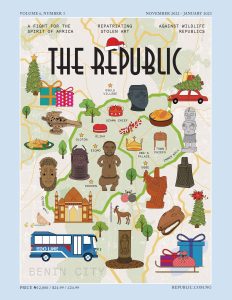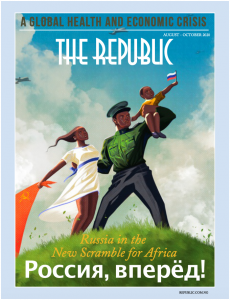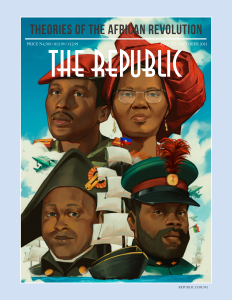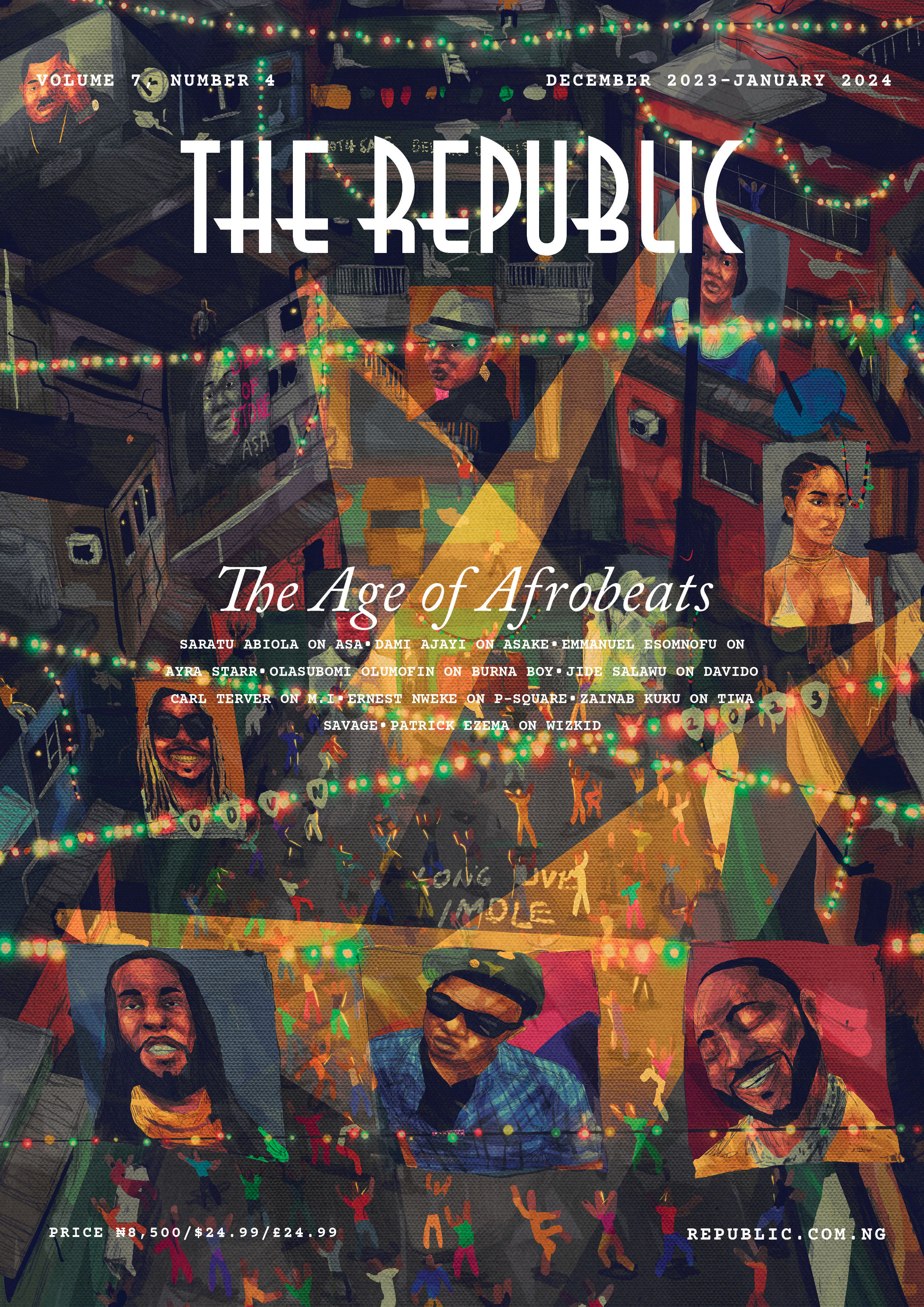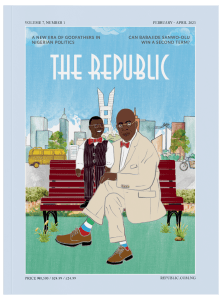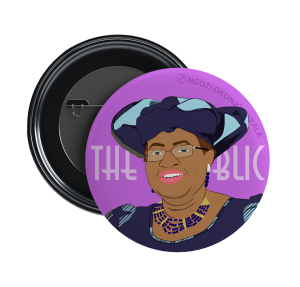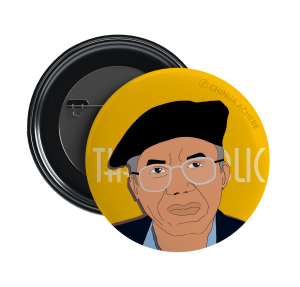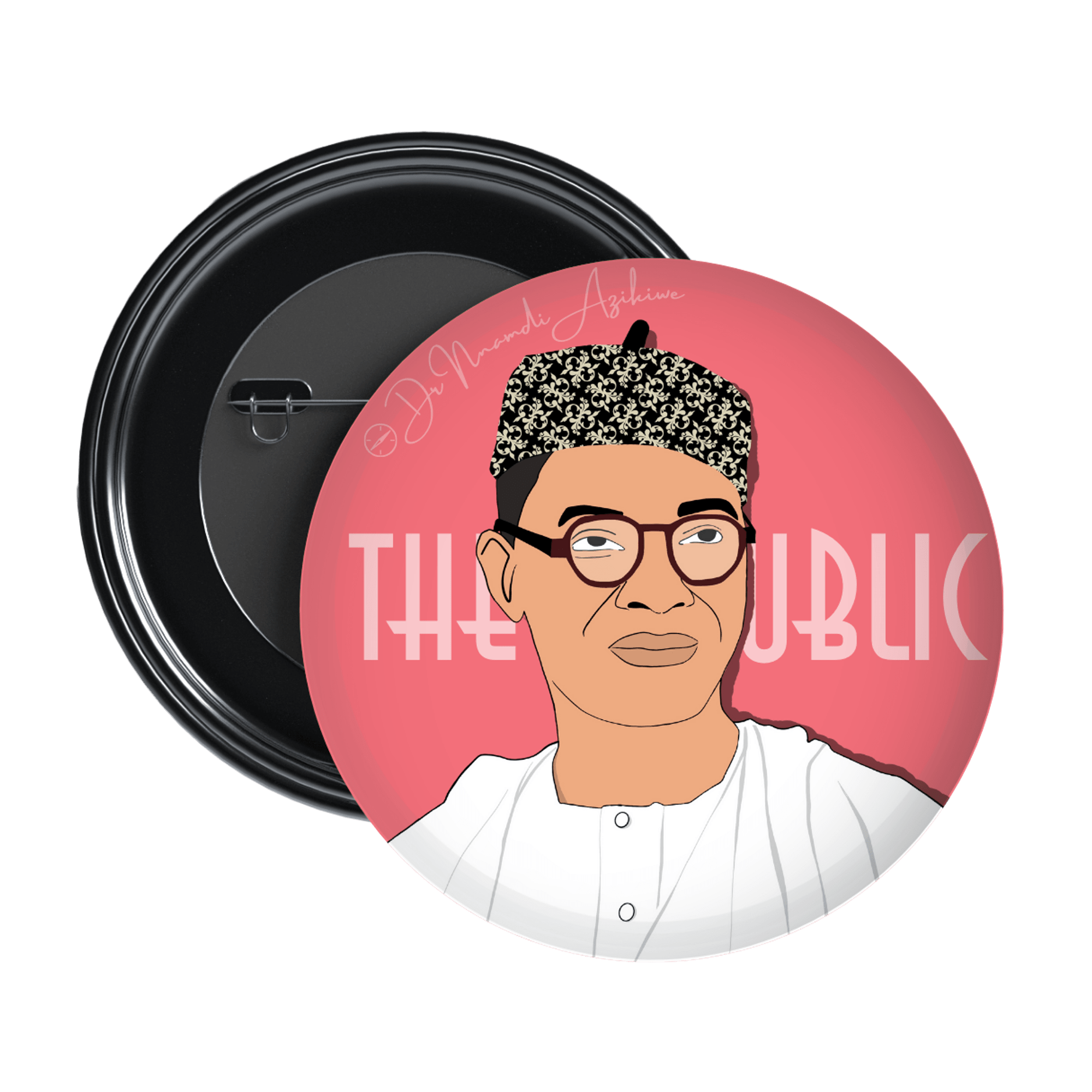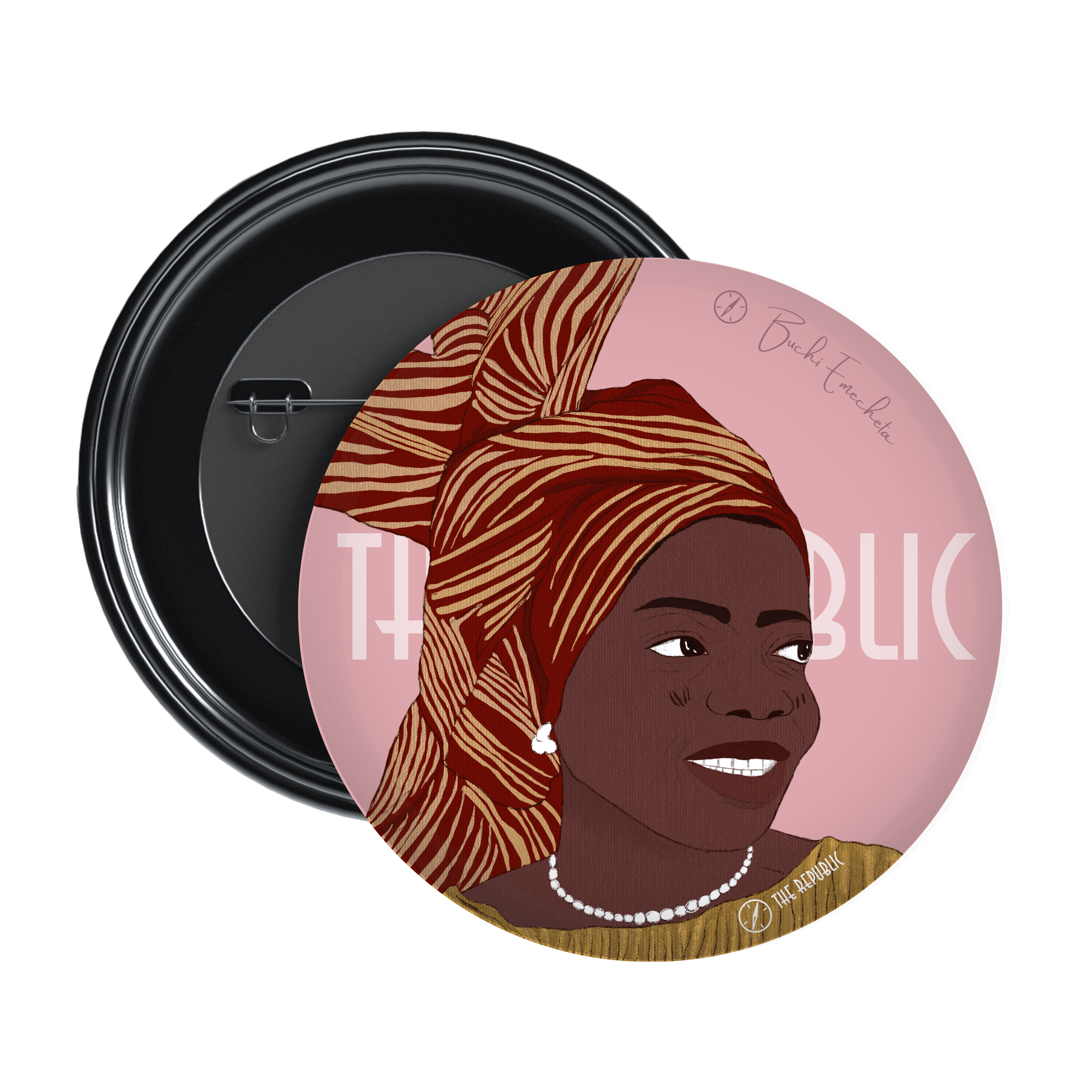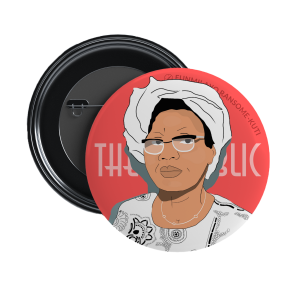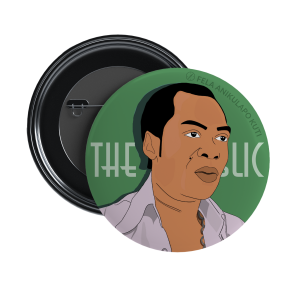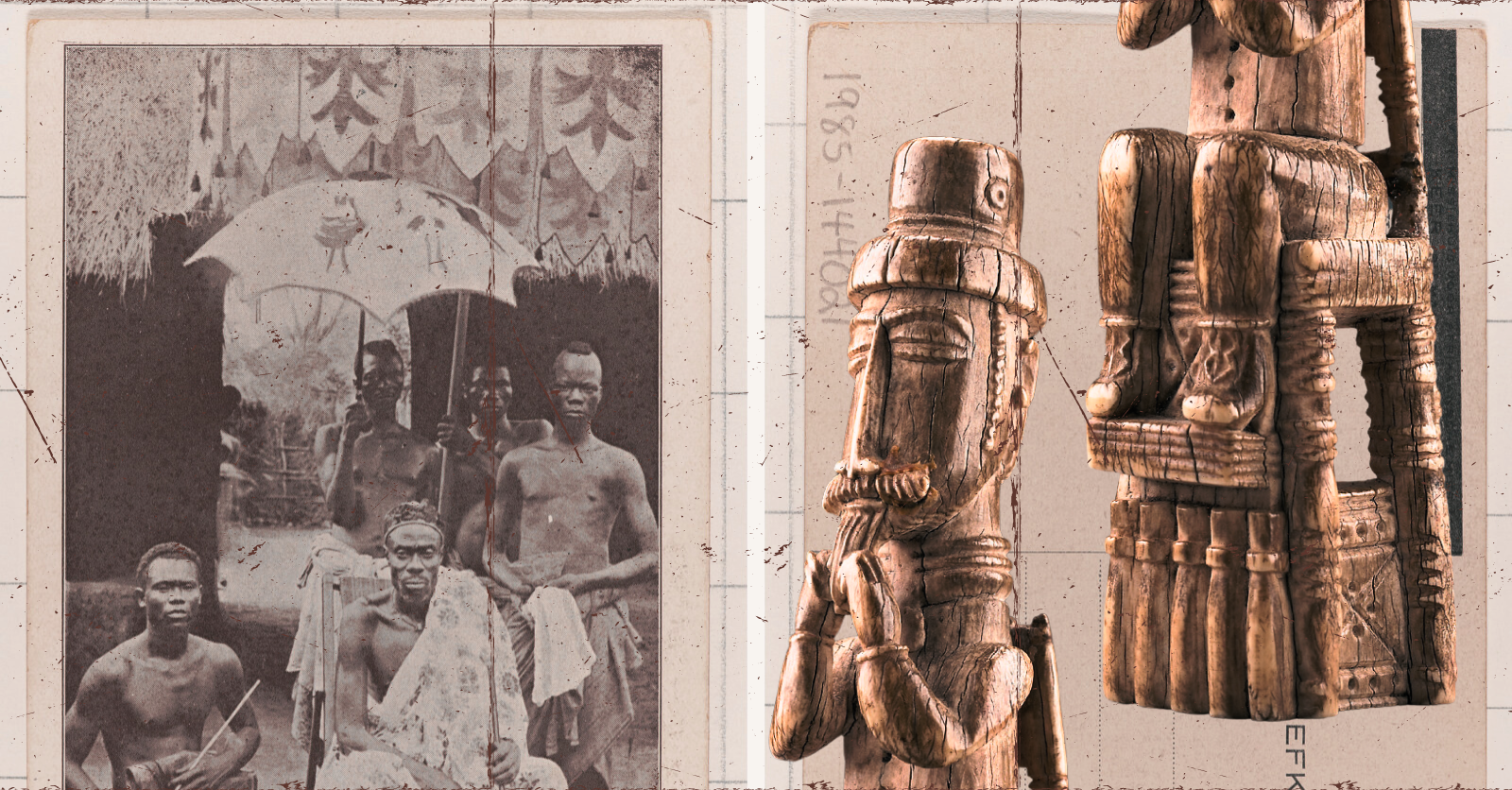
Left: An African Dignitary – The King of Alada (Dahomey, now Benin). Right: Ivory seated male-European figure with the hand gesture of an African elder. NATIONAL MUSEUM OF AFRICAN ART / SMITHSONIAN LAB. Photo illustration by Dami Mojid.
the MINISTRY OF IDEAS
Decolonizing the Language of Political Science

Left: An African Dignitary – The King of Alada (Dahomey, now Benin). Right: Ivory seated male-European figure with the hand gesture of an African elder. NATIONAL MUSEUM OF AFRICAN ART / SMITHSONIAN LAB. Photo illustration by Dami Mojid.
the MINISTRY OF IDEAS
Decolonizing the Language of Political Science
Political science in Africa has a relatively recent history. Political scientists began to take notice of the continent in the early 1950s, a period that coincided with the rise of nationalism and spirited calls for independence from colonial powers. As Africa buzzed with the excitement of newfound freedom, political scientists became increasingly optimistic about Africa’s political future. However, this optimism often overshadowed any consideration of the challenges that could arise post-independence.
Post-independence, African societies became the new frontier for political scientists. Yet, as they set their gaze upon this vast and diverse continent, they did so through a lens crafted far from the shores of Africa. Their conceptual toolkit, honed through years of study in the halls of American and European academia, seemed a natural fit. Terms like ‘social contract theory,’ ‘classical liberalism,’ and ‘modernization theory’ were the tools of their trade, borrowed from a landscape where popularly elected governments had long held sway. For these scholars, the familiarity bred by generations of analysing Western political institutions lent an air of universality to their scholarship. It was as if these concepts were as applicable in the heart of Africa as they were in the capitals of Europe or North America, where they were forged. Therefore, armed with these terminologies, such scholars ventured into the African political scene, seeking to apply Euro-centric concepts wholesale to African socio-political and linguistic contexts, scarcely pausing to consider the nuances and intricacies that might require adaptation. As a result, these imported concepts and theories lacked organic connection to African realities. After all, how can ideas forged in the crucible of Western political thought truly resonate in a vastly different cultural and socio-political landscape?
In their quest for universal Truths with a capital ‘T’, Western political scientists risk overlooking the unique political concerns and aspirations of African countries. By tethering themselves so tightly to Western frameworks and theories, they inadvertently limit their ability to develop truly inclusive and comprehensive understandings of politics in all its diverse forms.
WESTERN THEORIES AS TOOLS OF POWER AND EXCLUSION
Additionally, social contract theory posits that individuals surrender certain rights to form a society governed by common laws. In the Hobbesian version of the social contract specifically, Thomas Hobbes asserts that human beings are, by nature, self-interested, albeit rational. According to Hobbes, if society did not exist, human beings would live in the state of nature. Moreover, because human beings are self-interested and resources in the state of nature are limited, life in the state of nature would be ‘nasty, brutish, and short’ as each individual would be in constant fear of losing their life to another individual in the fight for those scarce resources.
In African political and philosophical thought, however, the social contract theory does not resonate. Notions of self-interest and individualism that underpin the social contract theory are alien to the African communitarian structure. As scholars of African political thought have argued, the state of nature never existed within the African communitarian structure. Philosophy scholar, Munamato Chemhuru, pokes a hole in the Hobbesian and Lockean conceptions of the state of nature by asserting that there was no time in the recorded history of humanity when human beings have been in a state of nature and social contract. Both are, at best, figments of Locke’s and Hobbes’ imaginations. Communitarian existence, however, is a socio-political reality that has been the fabric binding African communities together for eons. This is not to imply that individuals in African contexts must lose their uniqueness to blend with the community. In African communitarian thought, each human being still maintains their will, identity, and liberty. As Ghanaian philosopher, Kwame Gyekye, noted in the book, African Cultural Values: An Introduction, ‘The clan is like a cluster of trees which, when seen from afar, appear huddled together, but which would be seen to stand “individually” when closely approached.’
In addition, modernization theory, which gained traction in the mid-20th century, framed development as a linear progression from traditional to modern societies. At the heart of all variations of modernization theory is the implicit or explicit insinuation that there is a distinction between third-world or backward societies and modern societies. Rooted in Cold War ideologies, this theory perpetuated Western hegemony over many countries, particularly in Africa. The development of modernization theory coincided with the establishment of critical global development institutions, including the World Bank. Unsurprisingly, modernization ideas, including the link between economic development and industrial growth, free market economics, and globalization, informed the establishment of these global institutions and continue to influence their relationship with so-called ‘underdeveloped’ countries significantly.
However, African scholars claim that modernization theory is nothing short of a concept designed to continue the oppressive imperialism and extractive domination of poorer countries by the hegemonic West, especially the United States. Modernization frameworks of development continue to fail poorer countries because they are not designed for the advancement of those countries but as socio-economic Trojan horses for the West’s continued pillage of the Global South. The promise of modernization and development sold to African countries by powerful nations of the West and their agents (especially multinational conglomerates) have only left nationals of poor countries poorer. In many cases, the wealth gotten from under the feet of these people, especially in the form of natural resource extraction, hardly touches their hands. Ultimately, modernization theory is an instrument of power developed by the West and spread through its agents of soft imperialism—multinational corporations and Bretton Wood institutions—to perpetuate Western interests and continue the pattern of exploitation established in the colonial era.
shop the republic
Additionally, social contract theory posits that individuals surrender certain rights to form a society governed by common laws. In the Hobbesian version of the social contract specifically, Thomas Hobbes asserts that human beings are, by nature, self-interested, albeit rational. According to Hobbes, if society did not exist, human beings would live in the state of nature. Moreover, because human beings are self-interested and resources in the state of nature are limited, life in the state of nature would be ‘nasty, brutish, and short’ as each individual would be in constant fear of losing their life to another individual in the fight for those scarce resources.
In African political and philosophical thought, however, the social contract theory does not resonate. Notions of self-interest and individualism that underpin the social contract theory are alien to the African communitarian structure. As scholars of African political thought have argued, the state of nature never existed within the African communitarian structure. Philosophy scholar, Munamato Chemhuru, pokes a hole in the Hobbesian and Lockean conceptions of the state of nature by asserting that there was no time in the recorded history of humanity when human beings have been in a state of nature and social contract. Both are, at best, figments of Locke’s and Hobbes’ imaginations. Communitarian existence, however, is a socio-political reality that has been the fabric binding African communities together for eons. This is not to imply that individuals in African contexts must lose their uniqueness to blend with the community. In African communitarian thought, each human being still maintains their will, identity, and liberty. As Ghanaian philosopher, Kwame Gyekye, noted in the book, African Cultural Values: An Introduction, ‘The clan is like a cluster of trees which, when seen from afar, appear huddled together, but which would be seen to stand “individually” when closely approached.’
In addition, modernization theory, which gained traction in the mid-20th century, framed development as a linear progression from traditional to modern societies. At the heart of all variations of modernization theory is the implicit or explicit insinuation that there is a distinction between third-world or backward societies and modern societies. Rooted in Cold War ideologies, this theory perpetuated Western hegemony over many countries, particularly in Africa. The development of modernization theory coincided with the establishment of critical global development institutions, including the World Bank. Unsurprisingly, modernization ideas, including the link between economic development and industrial growth, free market economics, and globalization, informed the establishment of these global institutions and continue to influence their relationship with so-called ‘underdeveloped’ countries significantly.
However, African scholars claim that modernization theory is nothing short of a concept designed to continue the oppressive imperialism and extractive domination of poorer countries by the hegemonic West, especially the United States. Modernization frameworks of development continue to fail poorer countries because they are not designed for the advancement of those countries but as socio-economic Trojan horses for the West’s continued pillage of the Global South. The promise of modernization and development sold to African countries by powerful nations of the West and their agents (especially multinational conglomerates) have only left nationals of poor countries poorer. In many cases, the wealth gotten from under the feet of these people, especially in the form of natural resource extraction, hardly touches their hands. Ultimately, modernization theory is an instrument of power developed by the West and spread through its agents of soft imperialism—multinational corporations and Bretton Wood institutions—to perpetuate Western interests and continue the pattern of exploitation established in the colonial era.
shop the republic
INSTITUTIONAL GATEKEEPING AND THE MARGINALIZATION OF INDIGENOUS KNOWLEDGE
Besides, political scientists face difficulties when applying political theories to the African context because political science was birthed with a ready-made theory, namely the historical tradition of Western political philosophy—this tethers the field deeply to a Western orientation. In addition, most political science departments offering a course in political theory invariably focus on European classical philosophies and political ideas from Aristotle, Plato, Locke, and Hobbes. As a result, political theory confines itself to a narrow set of issues—Plato’s thoughts on the ideal type of polity, Aristotle’s conception of citizenship, and Hobbes’ idea of the ‘state of nature’. Laser-focused on Euro-Western political ideas and philosophies, Western political scientists isolate themselves from the rest of the world, which prevents them from developing theories that capture and address the unique political concerns of African countries.
Moreover, the fact that most academic articles in political science are written in English attests to the fact that indigenous political thoughts and political ideas from non-Western countries essentially have no space in political science. Primarily, global research communities hardly place a premium on publications in local languages.
In addition, journals that publish in local languages are not indexed by significant publishing indices, making them inconspicuous in the global academic arena. Relatedly, in terms of methods, theories, and themes, academic gatekeepers—publishers, journal editors, and reviewers—often favour familiar research modes. It is, therefore, more accessible for political science researchers trained in the Euro-centric research traditions to get published. Additionally, imperial tendencies are visible in the publication of academic journals. Academic articles written in English by scholars from Western, Educated, Industrialized, Rich, Democratic countries and/or top-ranked institutions get published more.
The spectre of race relations is another obstacle barring Western theories from proffering critical insights on African politics. This comes as no surprise, given that racism is entrenched in the field of political science. Susan Rahman, Prateek Sunder, and Dahmitra Jackson argued in their paper A People’s History of Structural Racism in Academia that,
Structural Racism is ingrained in the field by both the ‘founding scholars’ of political science and the actions that the field is used to excuse… Adam Smith writes about the necessary political and economic structure of nations to succeed. His ideal nations, or the wealthy nations of Europe, were described as ‘civilized’ with people who are ‘industrious’, leading to the success of the country. On the other hand, Smith describes ‘savage’ nations with people who are ‘miserably poor’, alluding to nations outside of Europe (Cannan (Ed.), 2019)… It is clear that both Adam Smith and John Locke, two of the most regarded figures in political science, were racist, and their racist ideas are ingrained in the field of political science and in American Politics.
Michael Lofchie, in his article Political Theory and African Politics, asserts that there is a fear that any study of Africa’s political landscape might inadvertently lend credence to notions of African incapacity for self-governance, perpetuating harmful narratives that have plagued the continent for centuries: ‘There is a concealed but very real fear that political research which is critical of independent African states might, somehow, lend credence to the premise of Black inferiority, or to that of an African incapacity for self-government.’ Given their apprehensions about race, these scholars navigate treacherous waters as they seek to engage with Africa’s political realities.
shop the republic
ALTERNATIVE EPISTEMOLOGIES AND WORLDVIEWS
Merely highlighting the Eurocentric nature of political science falls short; it is crucial to embrace alternative theories and viewpoints that authentically capture the diverse range of political experiences worldwide. First, using language like Global South/Global North to distinguish between Western and non-Western countries instead of language like underdeveloped/developed acknowledges the socioeconomic differences between these countries without implying a linear development progression. However, it’s important to acknowledge that the terms ‘Global North’ and ‘Global South’ have faced criticism for their broad and generalized nature. Specifically, the term ‘Global South’ fails to recognize the rich diversity within the regions it encompasses, including Africa, Latin America, the Caribbean, the Middle East, and Asia. This lack of nuance reinforces stereotypes, as it overlooks the unique characteristics and complexities of individual countries and regions.
Terms like ‘underdeveloped’ and ‘developing’ play a significant role in perpetuating an unequal global order and processes of exploitation that allow for some places to be ‘developed’ at the expense of others remaining ‘underdeveloped.’ Scholars like Samir Amin and Walter Rodney argue that these terms reinforce a dependency relationship between the ‘developed’ and ‘underdeveloped’ worlds. These dichotomous terms portray so-called ‘underdeveloped’ nations as backward, deficient, and in need of following the development model prescribed by the West. A narrative structure that justifies continued exploitation and domination by the capitalist centres. Besides, this dichotomy obscures the historical roots of underdevelopment, which have been traced to the processes of colonial exploitation, unequal exchange, and the extraction of resources from the periphery to fuel the development of the capitalist centres.
Additionally, fields like subaltern studies that focus on the history and experiences of marginalized, subordinated, and formerly colonized groups should be promoted more in Western political science scenes. The theory can add much-needed diversity to political science studies because it amplifies voices historically neglected in mainstream political studies.
To move away from the dominance of Eurocentric political philosophies, such as those of Aristotle, Socrates, and John Locke, which are central in the study of politics, it is beneficial to incorporate non-Western philosophies like Ubuntu, Confucianism, and Buddhism. This inclusion can enrich political science by exposing scholars to diverse epistemologies.
World systems theory is another theory that stands to add more nuance, diversity, and robustness to the study of political science. Developed by sociologist, Immanuel Wallerstein, the theory analyses the global economic system as a complex structure with core, semi-peripheral, and peripheral nations to challenge the Eurocentric view of development and explain the exploitative economic relationship between wealthy and less wealthy countries: ‘Man’s ability to participate intelligently in the evolution of his system is dependent on his ability to perceive the whole.’ Given its globally holistic view on socio-economic and political development and the relationship between countries, the world systems theory can offer novel ways to understand and engage critically with the complexity of political phenomena.
Overall, decolonizing the language of political science involves a fundamental reassessment of Western political theories and philosophy—what Indian historian, Dipesh Chakrabarty, calls the process of ‘provincializing Europe’. This entails reframing the Global North as a specific region rather than the central axis and acknowledging that historical interactions have been more one-sided due to imperial dominance that has silenced diverse voices.
A re-examination of the history of political science is also becoming imperative, aiming not only to acknowledge non-Western political traditions but also to emphasize how the absence of recognizing equality has distorted the West’s understanding of local and global politics since modernity. This revisionist history should actively engage with the epistemological and normative challenges the Euro-domination project has consistently faced.
To achieve true decolonization, the field of political science must embrace this paradigm shift, not just in the curriculum but also in hiring, promotions and publications. It is an ongoing, collective effort that requires support from all levels within the academic community, from senior faculty to students. Given the substantial changes in higher education structures, decolonizing the curriculum becomes imperative to provide students with a more comprehensive education and to ensure inclusivity in the field of political science. This transcends merely including people of colour in reading lists; it involves restructuring the field itself, encouraging political scientists to not just question but actively challenge imperial structures rather than endorsing the neoliberal ideals of ‘resilience’ and ‘hard work’. All of these necessitate a genuine acknowledgment of alternative viewpoints in analysing power dynamics, encompassing aspects of race, class, and gender⎈




